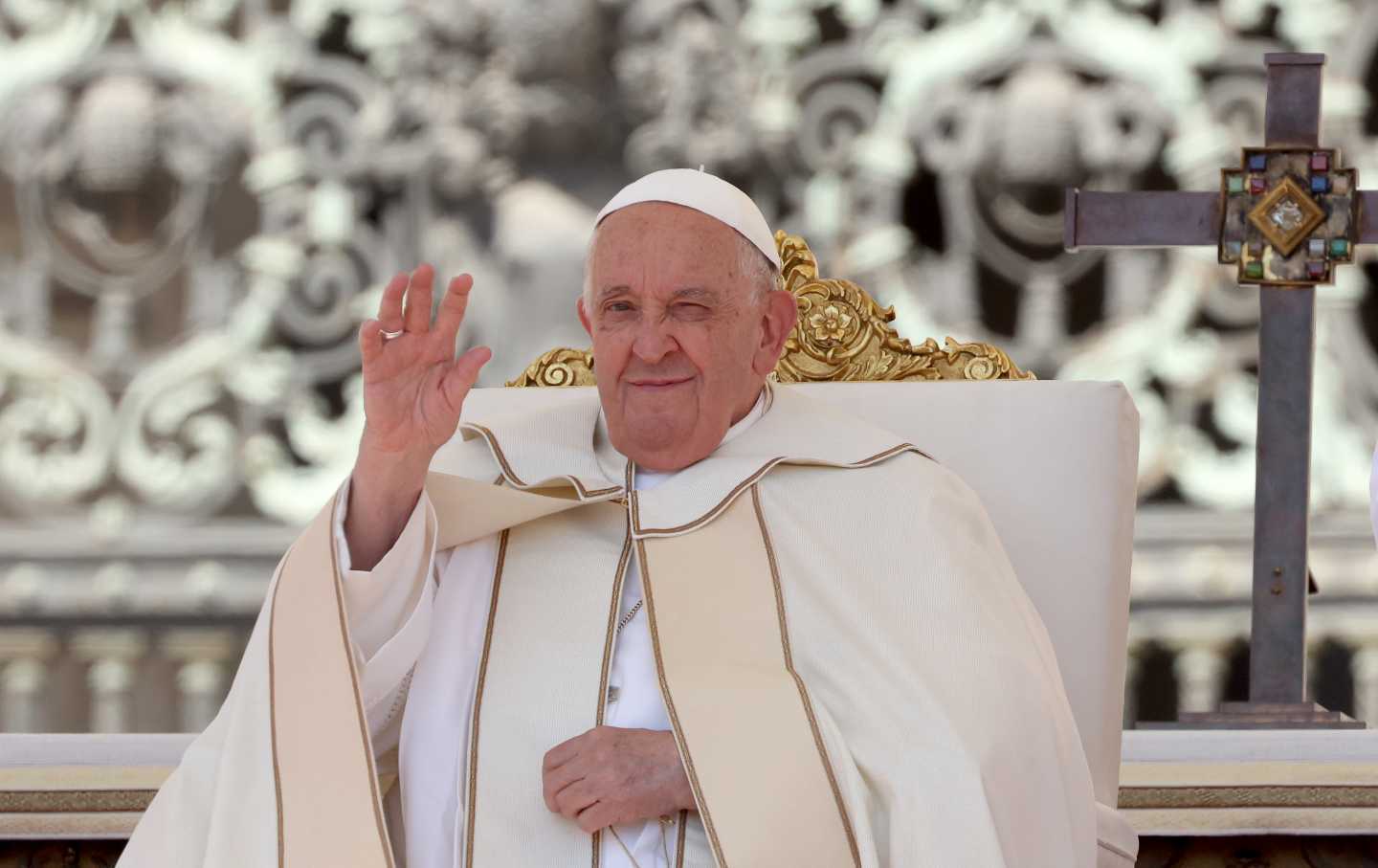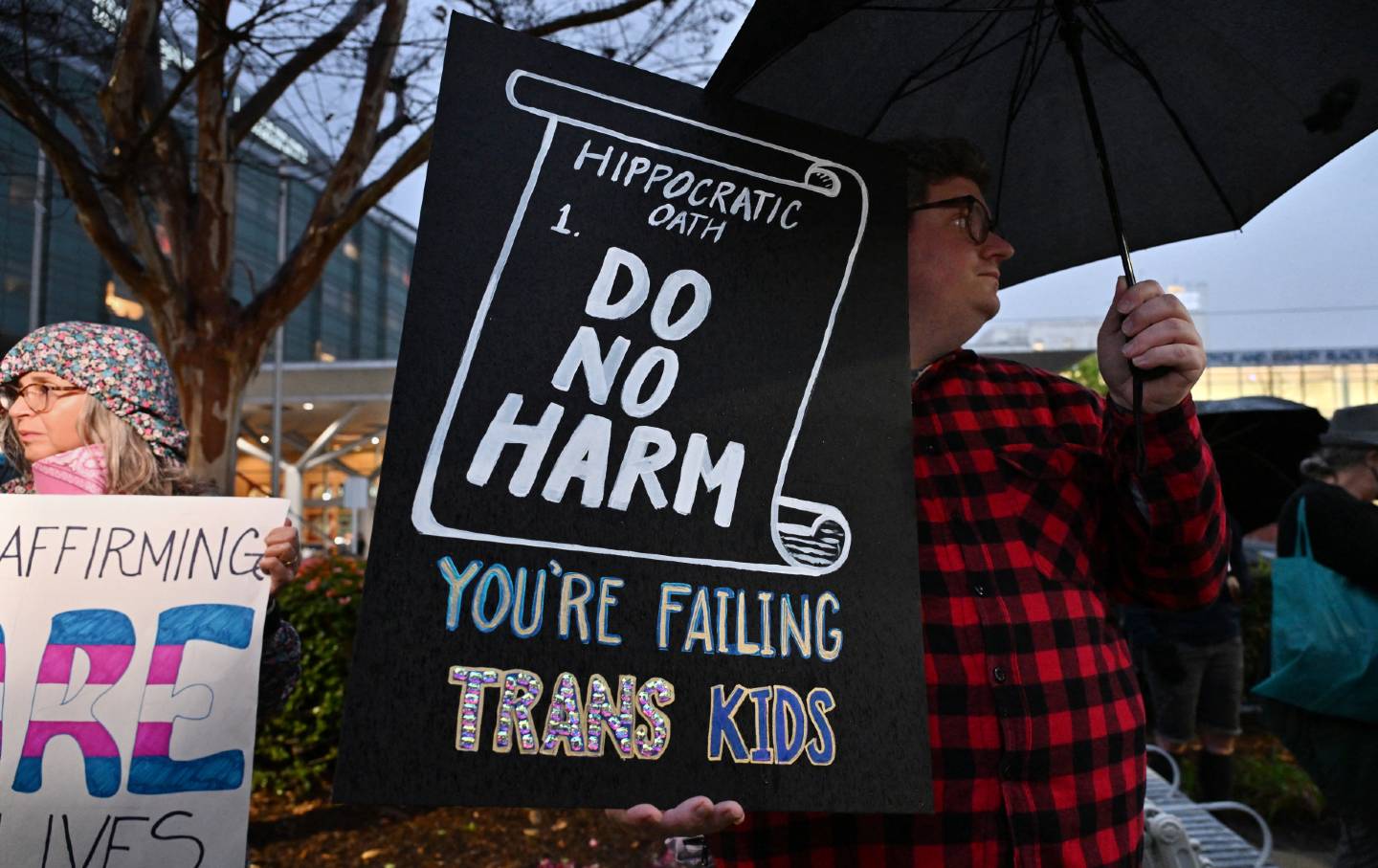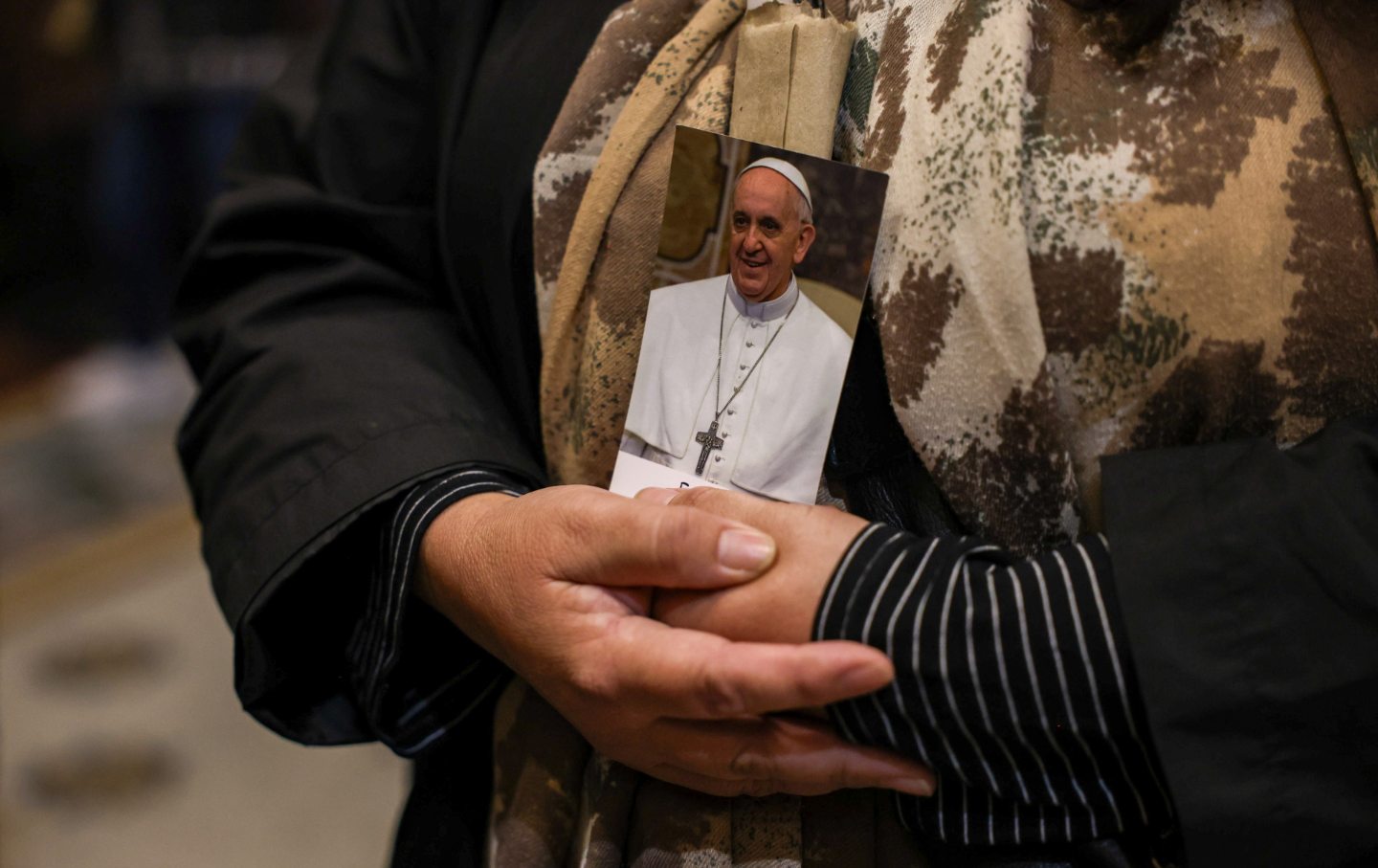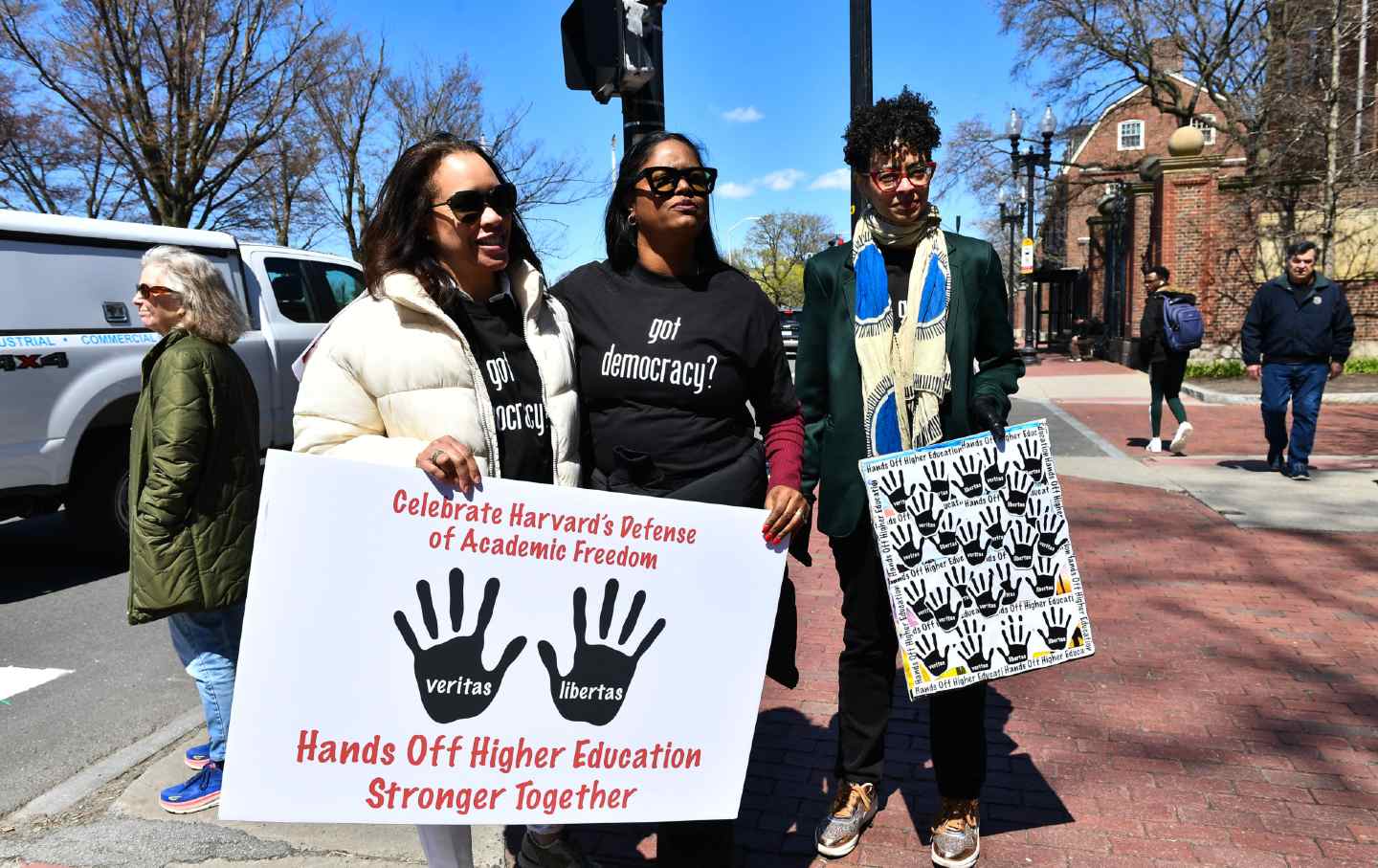The Trump Revival
To a growing contingent of right-wing evangelical Christians, Donald Trump isn’t just an aspiring two-term president. He’s an actual prophet.
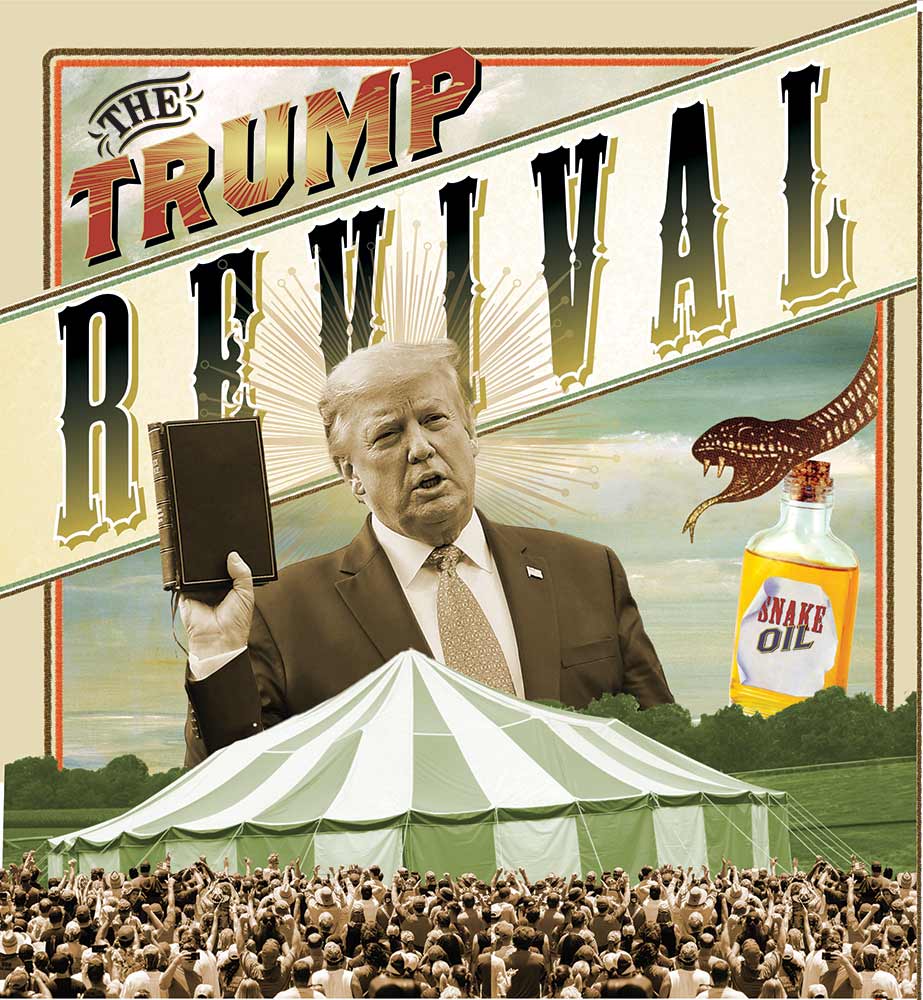
There’s a new entry in the warm-up material at Trump rallies, sandwiched between the classic-rock anthems and the demagogic diatribes of various local political leaders. It’s a two-minute video that Trump posted to his Truth Social account just prior to the third anniversary of the January 6 insurrection. Called “God Made Trump,” the campaign spot is brazenly messianic in tone and substance alike, directly paraphrasing the “So God Made a Farmer” speech made famous by the conservative radio personality Paul Harvey. “On June 14, 1946, God looked down on his planned paradise and said, ‘I need a caretaker,’” a Harveyesque narrator, no doubt manipulated by AI, announces at the outset. “I need somebody with arms strong enough to wrestle the deep state and yet gentle enough to deliver his own grandchild…. I need somebody who can shape an ax, but wield a sword”—here the video shows footage of Trump brandishing a scimitar among a group of Saudi leaders. The narration invokes the wonder-working powers of petroleum yet remains biblically tinged, with Trump as a figure “who can make money from the tar of the sand, turn liquid to gold.”
It goes on in this vein, as dire imagery and biblical paraphrases build toward a crescendo: “God had to have somebody willing to go into the den of vipers, call out the fake news for their tongues as sharp as a serpent’s. The poison of vipers is on their lips, and yet stopped. So God made Trump. God said, ‘I need somebody who will be strong and courageous, who will not be afraid or terrified of the wolves when they attack.” (Here a shot of a wolf baring its teeth briefly morphs into a photo of Democratic Representative Alexandria Ocasio-Cortez.) “A man who cares for the flock, a shepherd to mankind who won’t ever leave nor forsake them. I need the most diligent worker to follow the path and remain strong in faith, and know the belief of God and country.” Here the background video shows Trump caressing a flag, and being prayed over by a circle of preachers during his 2020 presidential run.
The Religious Right
Neatly distilling the central narratives of Trump’s 2024 campaign, while leaning heavily on well-established tropes from the politicized world of evangelical worship, the video delivers a central message: Trump and Trump alone is anointed as your country’s savior, and indeed your personal messiah. Placing Trump at ground zero in the battle for Christian control of the United States is an audacious move—he was, after all, the man who posted a holiday greeting to his Truth Social account inviting his rivals and critics to “rot in hell.” But as “God Made Trump” makes clear, a country besieged by malign and demonic forces can be redeemed only by unlikely and miraculous intervention from on high. God has chosen the person of Donald Trump to cast out all the many evil spirits holding the true America hostage.
As the 2024 election cycle lurches into gear, a torrent of allied spiritual appeals have reverberated through MAGA world. Like “God Made Trump,” these messages traffic in what Matthew D. Taylor, senior scholar at the Institute for Islamic, Christian and Jewish Studies, calls “prophetic memes”—nimble digital callouts to scriptural authority allegedly consecrating Trump’s reign that ricochet through evangelical media accounts and then gain viral authority in the sanctums of MAGA power.
The Trump revolution in the Republican Party has shed many of the last remaining vestiges of traditional interest-group alignments—most strikingly, the business-evangelical accord at the heart of the powerful Reagan coalition that reshaped right-wing politics in the 1980s—and has begun to morph into something unprecedented in modern American politics: a nakedly Christian nationalist push for maximum worldly power, primed to usher in a post-democratic age of state-sanctioned Kulturkampf on the right. What began as a faux-populist appeal to rescue an imperiled, mythic “real America” is now a full-fledged political revival movement, replete with personal redemption narratives, baptisms, and a new spiritual argot, steeped in the absolutist rhetoric and disposable memes of the Internet.

At the center of this transformation is a new ideological upsurge of activism on the evangelical right, sparked by the rapidly growing revivalist campaign known as the New Apostolic Reformation. The NAR is rooted in a long-standing alliance of charismatic worship and business-driven grievance politics, dating back at least to the post–World War II “Latter Rain” Pentecostal revivals that fused nuclear-age anxiety over the communist threat and the end of the world with homiletic glosses on the self-evident spiritual virtues of free-market capitalism. Since then, the charismatic strain of evangelical faith, which historically promoted experiential and anti-institutional modes of worship identified with poor white and African American congregations, has moved into the forefront of business-minded Protestant worship and political activism.

And over the past decade, the NAR has become a full-fledged vanguard political movement under the influence of leading prophet and strategist Lance Wallnau, a Texas-based oil-industry marketer turned entrepreneurial theologian. Organizing itself into elite cadres of worldly-minded prophets in the Wallnau mold, the NAR proposes to short-circuit the old model of evangelical political influence in favor of a proposal to annex the national government, together with other leading cultural and civic institutions, as part of a mission to revive the American Christian nation. “Everywhere the Church fails to exercise her authority a vacuum opens for darkness to occupy,” Wallnau writes in Invading Babylon, a landmark 2013 tract laying out the movement’s influential “Seven Mountain Mandate” for unrivaled control over the nation’s future course. “By rejecting the culture, we reject our spiritual authority to influence that culture. In the last days, however, there is no neutral territory. What we don’t possess becomes fair game to occupy for the purposes of harassing us!”
The leading NAR prophets and preachers have coalesced around a group called the Eagles’ Vision Apostolic Team, which focuses on conquering the “seven mountains”: politics, education, the media, the family, business, entertainment, and the church. If this agenda sounds impossibly lofty and abstract on paper, consider but one recent landmark policy win for NAR adherents: Alabama state Supreme Court Chief Justice Tom Parker cited the Seven Mountain Mandate in a podcast interview released the same day the court ruled to block use of in vitro fertilization on the grounds that fertilized embryos were persons, introducing a whole new level of hard-right sanctions on reproductive choice.
More broadly, NAR revivalism has come to serve as a spiritual way station for MAGA movement leaders such as Roger Stone, Michael Flynn, Charlie Kirk, Mike Lindell, and Donald Trump Jr. Over the past three years, preachers and movement intellectuals in the NAR’s orbit have sponsored a nationwide circuit of political revivals called the ReAwaken America Tour. Originally convened to protest the Covid-19 lockdowns, ReAwaken America has since grown into a rolling Chautauqua-style celebration of the spiritual side of Trumpism. Stone, who claimed an evangelical conversion experience in 2020, not long after Trump commuted his prison sentence, offers up his own faith testimonials alongside Flynn, whose strategic alignments with the Christian right go back to his flirtations with the QAnon conspiracy faith.
“If you think about when, historically, things like these tent revivals or great awakenings occur, they occur when there is a kind of cultural crisis at hand,” says Robert Jones, the president of the Public Religion Research Institute (PRRI) and the author of The End of White Christian America. The crisis sentiment now gripping the MAGA movement, he argues, is a spiritual variant of the great replacement theory—an outgrowth of the “collapse” of “white Christians clearly being the dominant political and cultural demographic force in the country.”
Because the NAR adheres to a deinstitutionalized model of religious experience, its influence on the right has been difficult to track with conventional polling and survey metrics, which typically follow strict denominational kinds of observance. Still, what research there is points to an imminent sea change. A survey released last summer by the PRRI labeled more than half of born-again Christians as charismatics. And the 2020 Religion Census found that nondenominational Christians now make up the largest segment of churchgoers. (Ever alert to the shifting spiritual landscape around him, Trump shifted his own formal religious affiliation from Presbyterian to nondenominational.)
Paul Djupe, a political scientist at Denison University, has conducted polls showing that one-third of believers in modern-day prophecy endorse the idea that Trump is anointed by God to be president. More than half of prophecy believers, and 20 percent of respondents overall, supported Wallnau’s call for the evangelical takeover of all the leading cultural institutions. That’s an astonishing percentage, given that Wallnau began promoting the idea less than 25 years ago. That level of support speaks volumes about both the nimbleness and the cross-denominational appeal of the NAR vein of prophecy belief.
This all helps to explain why, among mainstream commentators on American religion, “no one’s paid any attention to all the Pentecostals, the independent charismatics and NAR people, who are really Trump’s folks,” says Anthea Butler, the chair of the University of Pennsylvania religious studies department and the author of White Evangelical Racism. “All the talk you hear about demonic stuff, about violent stuff—people should take that very seriously.”
NAR leaders certainly take very seriously their role in a swelling prophetic army targeting the main bastions of cultural power—and have realized incredible gains over the comparatively short span of their movement’s rise to national influence. Prior to Trump’s 2016 presidential run, rank-and-file members of the American right’s vast religious wing had long felt disaffected with the transactional politics of the old conservative coalition, which relied on their culture-war support to activate campaigns at the grass roots but then often ignored them during the scrum for clout and influence in Washington.
With Trump’s rise, however, new possibilities for the direct seizure of state power became clear—principally under the tutelage of the loose band of charismatic figures and prophets of worldly rule clustered around the NAR. The charge is sealed, Wallnau argues in Invading Babylon, in a passage of the New Testament: Jesus’ announcement to the apostles that he sends them “as sheep in the midst of wolves.” For Wallnau and the NAR, this is another parable of worldly leadership—to convert the profane wolf kings in the fallen world to the cause of Christ: “When wolf kings honor the King of glory, they do not become weak kings. Quite the contrary, they become truly great, and more so, they have authority to reveal the glory hidden within their sphere of authority.” Wallnau has since captured this message in the name of the self-publishing outfit behind his tracts of Trump-centric prophecy: Killer Sheep Media, Inc.
Where Washington’s old evangelical establishment operated on the well-worn grids of transactional dealmaking, favor-trading, and strategic compromise, the charismatic MAGA world pursues a much more direct and Promethean path to spiritualized power: substitute your networks of influence for Satan’s, plug in the relevant state actors and faith impresarios, and prepare for the thousand-year reign of Christ. Elections and their faith-averse outcomes are strictly optional.

Believers in the NAR’s orbit no doubt view Wallnau’s entry into the rarefied world of MAGA prophecy as a work of divine intervention, or a cunning act of wolf-king courtship. But in reality, it came about via pure happenstance. When Trump was launching his presidential candidacy in 2015, he and his senior advisers understood the urgency of securing strong evangelical support. However, unlike other recent GOP presidential hopefuls, Trump had no sustained relationship with the leading lights of American evangelicalism, beyond some preliminary outreach to Jerry Falwell Jr., the former (and now-disgraced) head of Liberty University and son of the prominent televangelist who went on to found the Moral Majority. So Trump relied on his closest spiritual adviser, the Florida-based prosperity preacher Paula White-Cain, to broker his entry into the world of right-wing evangelicalism.
This proved a crucial move in several respects. White-Cain, like other leading preachers of the American prosperity gospel hymning worldly riches as an unmistakable sign of divine favor, came out of the charismatic Pentecostal tradition. Leaders such as Southern Baptists Jerry Falwell, Billy Graham, and Pat Robertson had long presided over king-making political operations like the Moral Majority and the Christian Coalition. But with White-Cain directing evangelical outreach for Trump, the team’s coterie of spiritual insiders was now made up of fellow charismatics like Wallnau.
“In the summer of 2015, Trump goes to White-Cain and says, ‘I want to meet with evangelical leaders,’” Taylor tells me. “And Paula White-Cain didn’t know mainstream evangelical leaders…. She came up in these televangelism, prosperity-gospel, and Black Pentecostal circles, and the leaders she knew were her fellow independent charismatics. And so she starts bringing these pretty avant-garde characters into these early meetings with Donald Trump in the fall of 2015; it’s apostles and prophets, it’s televangelists and messianic rabbis who get in on the ground floor of the Trump campaign. And that is where you start to get the nucleus of Trump’s religious advisory councils.”
As Trump powered his way to the Republican nomination, entrepreneurial outsiders like Wallnau recognized that the playbook had been rewritten for religious leaders who sought top-tier political influence. Traditional gatekeepers of evangelical power, such as Christian Coalition founder Ralph Reed and “family values” ideologue James Dobson, were no longer the first people in the room; now the inner circle was made up of charismatics like White-Cain. Much like the partisans of the nascent Trump movement, these religious innovators intuitively understood that a deeply anti-institutional, personality-driven approach was the path forward.
Popular
“swipe left below to view more authors”Swipe →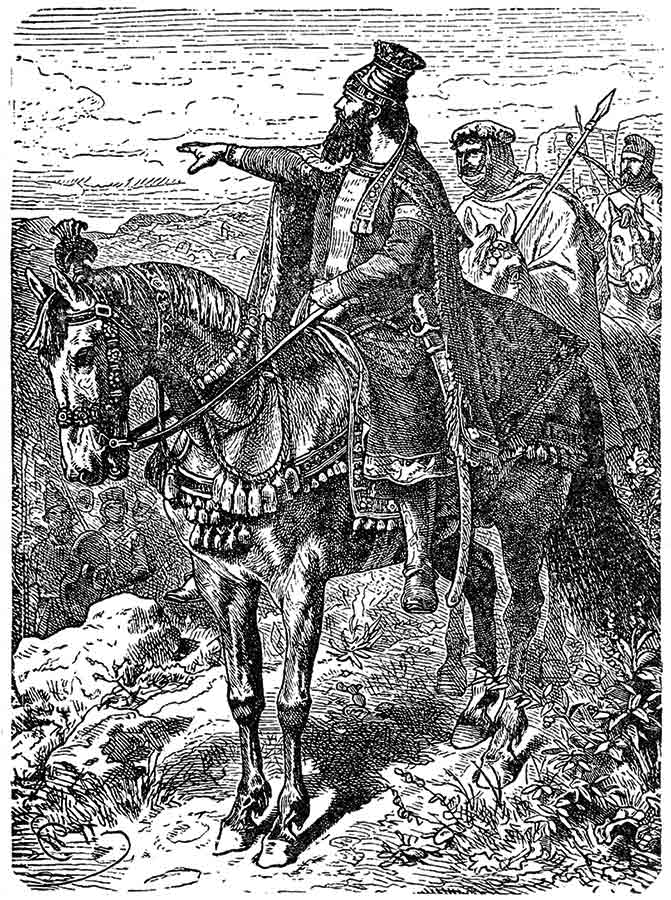
Wallnau promptly delivered an allegorical vision of Trump’s leadership that continues to resound throughout the evangelical world as the mother of all prophetic memes. Donald Trump, Wallnau proclaimed, was a direct spiritual heir to the ancient Persian King Cyrus, a pagan world leader who won God’s favor by allowing the Jews exiled in Babylon to return to the promised land and rebuild the Temple. The prophet who laid out the battle plan to invade modern Babylon now understood that the heretofore secular GOP presidential hopeful would, with God’s sanction, reclaim the citadels of worldly power on Christianity’s behalf.
“That became this kind of galvanizing moment for the rest of the NAR to really grab hold of Donald Trump, to grab hold of these Wallnau prophecies and line up around Trump and become the vanguard of Christian Trumpism,” Taylor says. “What happens as Trump starts winning these primaries is that suddenly the conventional power dynamic is inverted. So now all the people who were holding Trump at a distance—they’re having to come hat in hand to Paula White-Cain, trying to get access to Trump. Suddenly, Paula White-Cain is at the center of the hottest ticket in evangelical politics, and she is using that position of power to bring her type of people into the inner circle.”
A central doctrine that gives the NAR’s theological politics a distinctly militant charge is the notion of spiritual warfare. Where the main run of evangelical eschatology defers the settling of spiritual accounts to the aftermath of Armageddon—the Last Judgment and the Rapture—NAR apostles find the battle for cosmic control embedded firmly in the here and now: in the struggle to direct the leading institutions of public life and culture. To secure such gains, they prophesy the onset of a Third Great Awakening, a worldwide “billion-soul harvest” channeled through the mainstream arenas of power and influence. And the great corollary of this earthbound eschaton is the belief that the movement’s rivals for the control of worldly institutions are not merely mistaken or sinful—they are actual demons, to be vanquished by the full force of divine wrath. The old Protestant dream of a priesthood of all believers has been refurbished for a new spiritual order and a new, meme-fueled network of belief: Now each believer is an armed prophet, keen to reclaim the citadels of power from Satan and his minions.
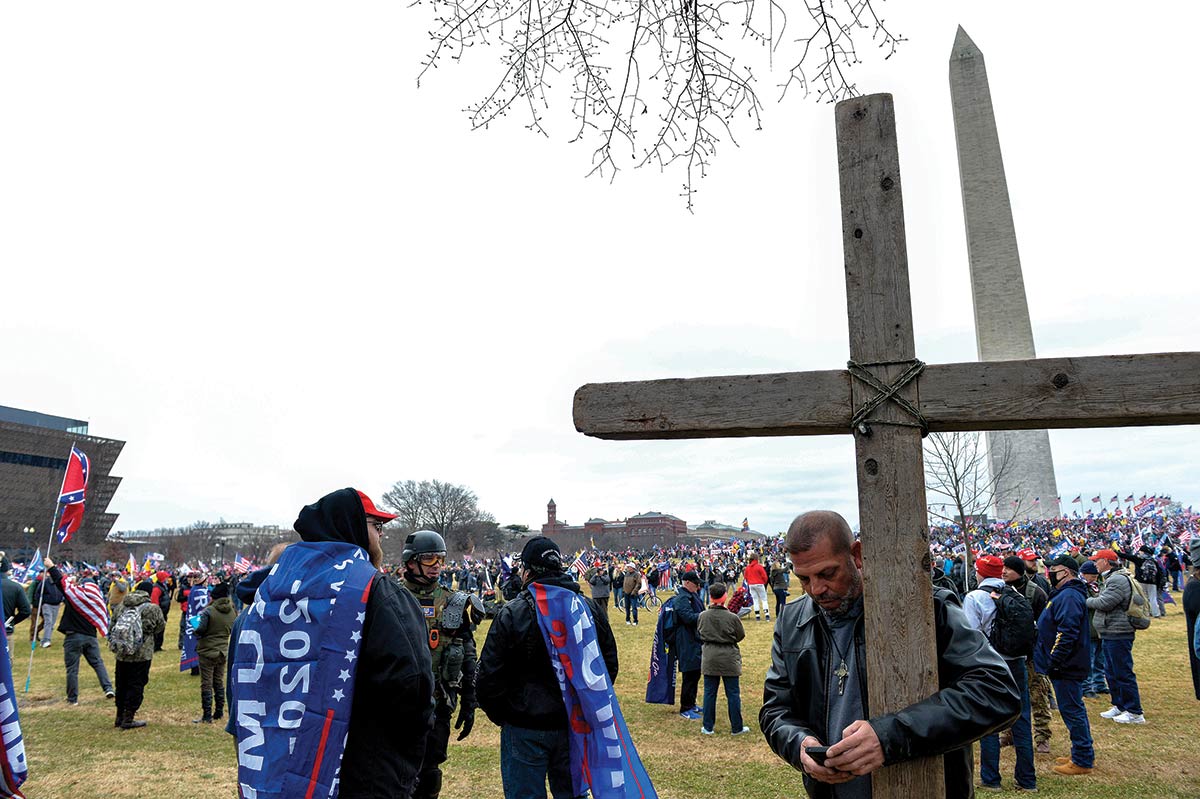
This is the metaphysical backdrop for the movement’s other great coming-of-age moment: the January 6 insurrection at the US Capitol. The religious mobilization behind Trump’s postelection coup attempt is perhaps one of the least-reported major political stories of our time. (And it’s been kept that way thanks in no small part to then–Wyoming GOP Representative Liz Cheney’s efforts to downplay the role of religious figures and ideas when she served on the House select committee investigating the failed coup.) “People like Wallnau gained so much credibility and followership through getting it right on these prophecies about Trump in 2016 that by the time the 2020 campaign rolls around, you have hundreds of charismatic prophets all prophesying in chorus that Donald Trump is going to win this election,” Taylor says. “They all have their own images and prophetic memes that they’re trying to attach to the election…. The election gets called for Joe Biden, and Trump refuses to concede, and almost all of these prophets say, ‘Then God is going to have to intervene, because we’re not backing off Donald Trump. God will miraculously intervene.’”
This set the stage for spiritual warfare with the highest possible stakes. “In 2020, NAR leaders now have access to the White House,” Taylor explains. “They now have all these spiritual-warfare and prayer networks that they’ve built, and they’ve got this incredible celebrity clout in charismatic media. And so they orchestrate what has to be one of the most impressive spiritual-warfare campaigns in American history.” In December 2020, evangelical leaders convened what they called a “Jericho March” in Washington to protest the election results—and to castigate the victorious Biden coalition in the starkest prophetic rhetoric, identifying the Democratic opposition as Satan’s minions. This spiritualized beer-hall putsch drew directly from the organizing efforts of NAR prophets across the country. “There are Jericho Marches going on in swing-state capitals [that are] often led by local NAR leaders,” Taylor says. “There’s the major Jericho March where [self-styled NAR prophet] Cindy Jacobs and Lance Wallnau speak. They’re in D.C. on December 12.” Anthea Butler, of the University of Pennsylvania, says, “This notion that January 6 was a Trump thing—no, it was a religion thing, a mishmash of religious believers who have coalesced around Trump. The religious test now is: How close are you to God?”
Jeff Sharlet, a longtime chronicler of vanguard movements on the religious right and the author of The Undertow, a dispatch from Trump country, concurs, also citing the fissures of January 6 as an inflection point. “In some ways, Mike Pence is a great illustration of the shift,” Sharlet says. “He was sold to Trump as the transaction that would nail down the evangelicals, but what he didn’t understand was that he was a booster rocket for the merger of MAGA and the evangelicals. That merger has happened now, and this is the thing where I’ve been saying I was wrong: I used to think full-fledged fascism wasn’t possible in the United States, precisely because of Jesus.”
In the run-up to January 6, NAR apostles took the new MAGA faith mandates to heart, following the directive of the MAGA Cyrus himself to launch an equally potent mustering of spiritual warriors throughout the rest of the country. Taylor points to the example of NAR apostle William “Dutch” Sheets, who claims to have been directly solicited by the Trump administration. “White House officials reached out to him shortly after Trump was declared the loser and said, ‘Why don’t you mobilize a prophecy and spiritual-warfare movement and go to every one of the swing states?’” Taylor says. “And he does. He takes a group of 15 to 20 NAR apostles and prophets and goes to every one of the swing states and stages these huge rallies there. Nobody in the media was paying any attention to this, but hundreds of thousands of people were watching these rallies. The words of these prophets are full to the brim with very violent rhetoric and really stir up this hope and this anger.”
The groundwork for this militant call to arms had been laid in 2020, six weeks prior to the presidential election, with the launch of FlashPoint, an online prophecy-themed current-events TV show that features Wallnau as a frequent panelist. It was distributed via the Victory Channel, a studio run by Kenneth Copeland, a right-wing prosperity televangelist. “As soon as FlashPoint launches in September of 2020, it goes to 50,000 views on YouTube that month,” says Taylor, who reviewed the numbers with NBC News reporter Mike Hixenbaugh. “And then they get 150,000 views in October, and then 1.4 million views in November, 6.1 million views in December. By January, it’s over 32 million views. This reflects the exponential growth of attention being paid to these prophecies. So you just have this flood of propaganda, of prophecy, all coming into this charismatic media space…. And then those same people show up on January 6. Cindy Jacobs, Becca Greenwood, and Lance Wallnau, all members of the Eagles’ Vision Apostolic Team, are there in D.C., along with a number of other people. I’ve tracked more than 50 independent charismatic leaders who were in D.C. for January 6. And they’re leading spiritual warfare.”

Because the official inquiries and legal proceedings surrounding January 6 have largely sidestepped the critical evangelical bloc that helped plan and execute the insurrection, its role in the uprising has taken a back seat in public discourse to the procedural and political defense of the “Big Lie” of election denialism. The agitprop falsehoods that Trump, Rudy Giuliani, Sidney Powell, and John Eastman have parroted about the election’s outcome have dominated public discussion, even as the NAR-branded version of the same narrative has been hiding in plain sight. The organization sponsoring the “Stop the Steal” rally at the Ellipse that led directly to the siege of the US Capitol was Women for America First, a group founded by the evangelical Tea Party activist Amy Kremer and her daughter Kylie. The religious character of the gathering was conveyed in its title—“Save America”—and in the opening remarks of Trumpian cable pundit Katrina Pierson, another founding Tea Party activist. Pierson kicked things off at the Ellipse by declaring that Trump had “sacrificed everything for his country and asked nothing in return” and was fiercely determined “to provide and protect our basic values to keep our nation free and our people able to go to church.”
The spiritual insurgency of January 6 also underlined another defining trait of the NAR movement: Its interest in democratic governance, like its interest in other features of political and cultural life, is purely instrumental—and once a democratic result defies prophecy, as it did in 2020, that outcome gets instantly discredited as another show of demonic strength. “It’s fascinating, and it explains how they’re different as an interest group,” says Washington State University historian Matthew Avery Sutton, who specializes in American prophecy belief. “For them, the idea of democracy and majority rule doesn’t matter. It’s not part of any equation for us to expect them to concede an election—it’s not thinkable. You can’t have majority rule when the devil rules the majority. You can’t negotiate; you can’t compromise.”
With its mettle having been tested in the January 6 uprising, the charismatic movement has quietly taken center stage in much of Trumpworld, with savvy MAGA-aligned strategists extending a warm welcome. This new alliance may have gone largely unnoticed because it’s hard to recognize. “What we’re seeing in terms of the evolution of Christian nationalism is something that the left is having a hard time understanding, or trying to understand,” Sharlet says. “People are stuck in thinking that the Christian nationalists are the bad guys in Footloose, when they literally look and sound and dance like Kevin Bacon. No one understands the kind of nimble thinking that’s going on.”
The spiritual MAGA formation has rapidly cycled through three main phases, Sharlet argues: “When you look at the religiosity of the Trump phenomenon, you go from prosperity preaching to gnosticism to what we’re in now, which I think is a martyrdom period. And martyrdom is pretty complex; what people are not getting about Trump and Trumpism is that this movement is developing a theology of its own. It makes missteps, and people think it’s clumsy. But go back and look at [Martin] Luther: He wasn’t concerned with consistency and logic so much as getting the right message.”
As Trump’s campaign continues to gain momentum, the pivotal station of the cross—the court-engineered spiritual persecution of Donald Trump—has taken center stage. “The courtroom is obviously a martyrdom thing,” Sharlet says. “There’s something very innovative there—how do you get a martyr with a fist? Usually, on the evangelical right, you show others who have a fist; they’re doing it as a fist on behalf of Jesus. Sometimes you see Jesus fluttering over a cop or something. But when you think of the Christian iconography of Trump, he is the Jesus figure on a tank. Or maybe there’s a Jesus figure hovering somewhere behind him, but Trump is always the focus. It’s an incarnation…. I think in the beginning Trump was shaping the movement, but now the movement is shaping him.”
Which is not to say that Trump doesn’t relish being shaped—especially when the outcome is the image of him as a martyr/messiah figure in the charismatic world of Christian nationalism. Indeed, the evangelical right proffers what are arguably the two critical features of mass politics in the age of Trump: a readily reproducible litany of cultural grievance, and a preexisting affinity for maximum leaders imbued with movement charisma. It’s also important to note that this core appeal, like much of the NAR’s messaging, goes far beyond the conventional boundaries of Protestant belief and practice. “On January 6, you had all these people like Ashli Babbitt [a Trump supporter who was fatally shot while breaching the Capitol] who weren’t churchgoers, but who were still doing it for religious reasons, for Jesus,” Sharlet says. “It’s the great deinstitutionalization of faith.”
And Trump is, if nothing else, a great political prophet of deinstitutionalization, having spent his tour as a spiritual leader carefully modulating the outer limits of his rhetoric to produce the fiercest response in the MAGA base. “You had all this interest in 2020 when Trump started invoking QAnon and people were doing these religious salutes at his rally, but then it all sort of fades. And that gets the independents thinking, ‘Why are people getting hysterical?’” Sharlet says. “And now, in the martyrdom phase, he’s really speaking in openly messianic terms. It’s the same thing going on with what he’s saying about the nation’s blood. He’s going to back off and let it stew, until it becomes the norm.”

In his current prophetic guise, Trump can confidently reap the benefits of both a cult of personality and a spiritual regiment preparing for the final battle. “He’s able to take his message directly to the people in the pews and bypass the Reeds and Falwells of the world,” says Sutton. “That’s an ultimate gain for Trump and his allies, in the sense that these followers are never going to be satisfied until we have the Kingdom of God on earth.”
And Trump’s flock is more primed than ever for such appeals. “What has occurred since January 6,” Taylor says, “is a broader charismaticization of right-wing politics, where charismatic spirituality, charismatic spiritual warfare, charismatic experiential worship styles, have become the lingua franca not only of the religious right, but of just the broader right, the far right. If you’re going to a Republican rally, they’ll often start out with 45 minutes of charismatic worship, and it’s immersive. And then maybe afterwards somebody gets up and says, ‘I have a prophecy about Donald Trump.’ The epistemological barriers have intentionally been lowered because people want access to the miraculous, and they want to believe that the miraculous is going to break in. And then the miraculous breaks in, and it’s Trump.”
Under the dual influence of Trump and charismatic prophets in the NAR vein, right-wing evangelicals have shed past shows of diffidence about racist and authoritarian extremism and begun to broker full spiritual communion with these ugly forces. It’s now common for virulent antisemitic conspiracy theorists like Scott McKay and Charlie Ward to turn up at ReAwaken America events, while sub rosa marks of fascist affiliation, such as social-media citations of the “14 words” at the core of replacement-theory racist doctrine—“We must secure the existence of our people and a future for white children”—now enjoy growing sanction on the MAGA right. Trump movement leaders are already rallying around the Heritage Foundation’s Project 2025 and its Mandate for Leadership: The Conservative Promise, an 887-page playbook for regaining power in Washington modeled on a series of policy and personnel manuals originally directed at the Reagan administration.
“If you put the NAR next to Project 2025, all these former Trump officials, Heritage, and the [evangelical legal advocacy group] Alliance for Defending Freedom—it’s a very unusual network in terms of the number of organizations,” Sharlet says. “And in the introduction to Project 2025, I was sort of surprised they are trying to smooth over a genealogy between Reaganism and Trumpism, and they have four fronts they say that the movement must rely on. And the first front, the manual says, is to ‘restore the family as a centerpiece of American life and protect our children.’ The other fronts are deregulation, basically. And when you look at it in terms of the NAR influence within this project and other things, you see that this rhetoric is Q-coded—it’s ‘protect the blood,’ it’s the 14 words, it’s all this stuff.” In other words, as an actual biblical prophet long ago proclaimed in the Savior’s name: new heaven, new earth.
Hold the powerful to account by supporting The Nation
The chaos and cruelty of the Trump administration reaches new lows each week.
Trump’s catastrophic “Liberation Day” has wreaked havoc on the world economy and set up yet another constitutional crisis at home. Plainclothes officers continue to abduct university students off the streets. So-called “enemy aliens” are flown abroad to a mega prison against the orders of the courts. And Signalgate promises to be the first of many incompetence scandals that expose the brutal violence at the core of the American empire.
At a time when elite universities, powerful law firms, and influential media outlets are capitulating to Trump’s intimidation, The Nation is more determined than ever before to hold the powerful to account.
In just the last month, we’ve published reporting on how Trump outsources his mass deportation agenda to other countries, exposed the administration’s appeal to obscure laws to carry out its repressive agenda, and amplified the voices of brave student activists targeted by universities.
We also continue to tell the stories of those who fight back against Trump and Musk, whether on the streets in growing protest movements, in town halls across the country, or in critical state elections—like Wisconsin’s recent state Supreme Court race—that provide a model for resisting Trumpism and prove that Musk can’t buy our democracy.
This is the journalism that matters in 2025. But we can’t do this without you. As a reader-supported publication, we rely on the support of generous donors. Please, help make our essential independent journalism possible with a donation today.
In solidarity,
The Editors
The Nation


